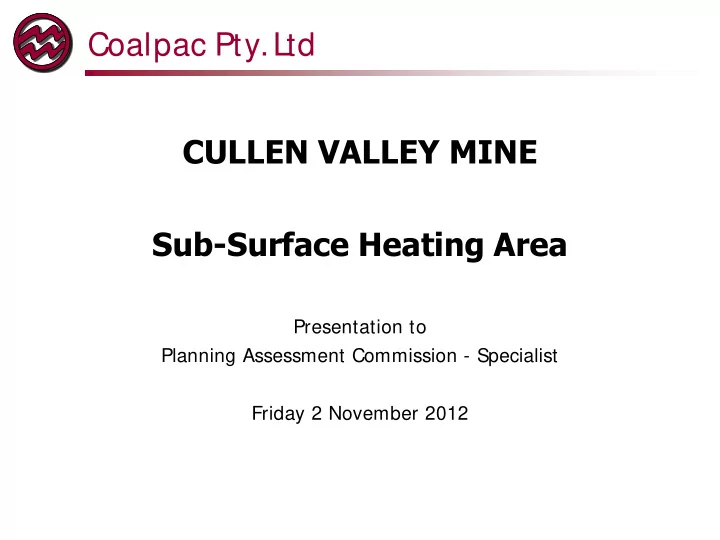

Coalpac Pty. Ltd CULLEN VALLEY MINE Sub-Surface Heating Area Presentation to Planning Assessment Commission - Specialist Friday 2 November 2012
Agenda Introduction Background & History Monitoring results Key findings Works completed to-date Way forward
Background & History Tyldesley Colliery - Officially abandoned 29 th July 1960
Background & History
Open Cut 2000 Lithgow Coal Co. started Cullen Valley Mine. 2004 Cullen Valley Mine found an active underground fire in Lithgow Seam on W side of Tyldesley Hill. 2007 it was noted fire was confined to fallen tops in roadways. Carbonaceous material placed low over burden & clay sealed. February 2008 Coalpac purchased the Lithgow Coal Company
Mining Scheme Seams Katoomba Middle River Moolarben Upper Irondale Irondale Lidsdale Lithgow March 2009
UG Heating - 24 June 2003
UG Heating – 17 Dec 2003
UG Heating – 17 July 2004
UG Heating – 20 Sept 2004
Vegetation Survey – Oct 07
Vegetation Survey – May 09
Vegetation Survey – Oct 11
Vegetation Survey – Feb 12
Climate Cullen Valley Mine Rainfall 1200 1000 Annual Rainfall (mm) 800 600 400 200 0 2004 2005 2006 2007 2008 2009 2010 2011 2012
Monitoring Range of monitoring activities: Water level in workings Thermal imagery (ground & aerial) Temperature probes Rehabilitation condition Vent gases Meteorological conditions
Monitoring Venting Adjacent To The Backfilled Highwall Crest 2010
Monitoring Heating activity in noise bund
Monitoring Heating Affected Material Exposed In The Noise Bund Prior To Wetting Thermal Image of Heating Affected Material Being Excavated From Noise Bund After Wetting (note reduction in smoke and steam compared to above)
Monitoring
Monitoring
Results & Key Findings RESULTS 5 Dec 2012 monitoring commenced 70 recorded results for each thermocouple since inception of monitoring 1550 O C maximum recorded temperature (# 5, 22m) 12 O C minimum recorded temperature (# 6, 15m) KEY FINDINGS Temperatures are generally greater with increasing depth When disturbed temperatures rapidly rose by > 1000 degrees, believed to be due to the ingress of air; Capping has maintained constant lower temperatures (holes 1, 2 & 3)
Works completed to date Mar 2011 - Development of the Cullen Valley Mine Heating Response Plan 2011 Photographic and thermal image monitoring (ongoing) Clay capping and sealing areas of venting along high-wall (ongoing) 1 st Quarter 2011 - Capping highwall section of main heating area; Dec 2011 - Installation of 12 thermocouples at six locations in main heating area Jan 2012 - Engaged specialist consultants with experience in treating heat effected areas, site visit & preliminary advice Feb 2012 – Commence removal of heating material from Noise Bund Jun 2012 - Noise Bund Plan of Works completed Sep 2012 – Submission of Draft Plan of Management for Heating Area submitted to DRE
Way Forward Stage 1 Noise Bund to be completed by June 2012 Stage 2 Raise Haul Road and clay cap main heating area face Stage 3 Infill central valley area and cap with clay Plan of Management Developed for Main Heating Area Based on input & advice from OEC; Provides for progressively improving conditions, especially in relation to air quality & vegetation impacts; Enables monitoring to compile heating data; Enables fact-based strategies to be investigated, avoiding implementation of adhoc actions that would have a low probability of ‘success’
Way Forward – cont. Investigation process to include: Initial period of collecting information from all available sources Assess performance of current treatment strategy Brainstorm possible additional treatment options (if required) Coalpac’s commitment is to ‘containment’ that will lead to long term extinguishment, until data suggests otherwise
Recommend
More recommend